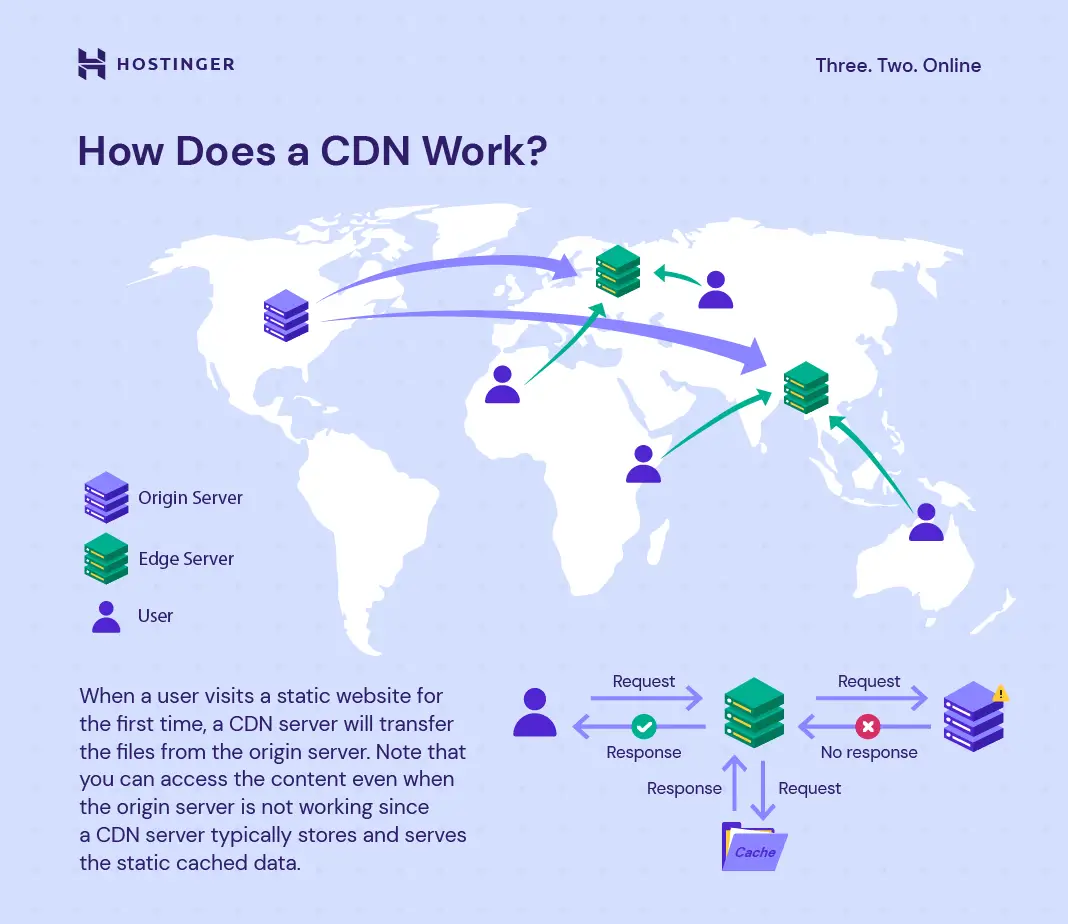Content Delivery Networks (CDNs)

Definition:
A CDN is a distributed network of servers that provide content to end-users from the nearest location, reducing latency and improving website load times.
Impact on Web Hosting Efficiency:

1. Reduced Load Times:
CDNs cache frequently accessed content on servers closer to end-users, eliminating the need for data to travel long distances. This significantly reduces page load times, improving user experience and website performance.
2. Increased Availability:
CDNs have multiple servers spread across different locations. If one server experiences an outage, the content is still available from other servers, ensuring high availability of website content.
3. Reduced Bandwidth Consumption:
CDNs cache content locally, reducing the amount of data that needs to be transferred from the origin server. This frees up bandwidth for other essential tasks, improving overall website efficiency.
4. Improved Scalability:
CDNs can handle increased traffic by distributing the load across multiple servers. This ensures that websites remain accessible even during peak hours, preventing slowdowns or outages.
5. Enhanced Security:
Some CDNs offer security features, such as DDoS mitigation and SSL encryption, which protect websites from malicious attacks and data breaches.
6. SEO Benefits:
Faster website load times improve user experience, which can lead to higher rankings in search engine results pages (SERPs). Additionally, CDNs can provide content localization, which can enhance user engagement and SEO performance.
7. Cost Savings:
By reducing bandwidth usage and improving website efficiency, CDNs can help reduce hosting costs for businesses.
Considerations for CDN Implementation:

- Content type: CDNs are most effective for static content, such as images, videos, and CSS files.
- Geographical distribution: Consider the target audience’s location and the distribution of CDN servers.
- Origin server: Configure the CDN to work seamlessly with the origin server and avoid potential conflicts.
- Monitoring and optimization: Regularly monitor CDN performance and optimize settings based on usage patterns and user behavior.
Conclusion:
CDNs play a crucial role in improving web hosting efficiency by reducing load times, increasing availability, and enhancing security. By implementing a CDN, businesses can provide a faster, more reliable, and secure online experience for their users.# Understanding The Impact Of Cdns On Web Hosting Efficiency
Executive Summary
Content Delivery Networks (CDNs) significantly enhance web hosting efficiency by distributing website content from multiple geographically dispersed servers. This approach optimizes website loading speeds, improves user experience, and strengthens overall website performance.
Introduction
In the realm of web hosting, optimizing website performance is paramount to ensure a seamless and engaging user experience. Content Delivery Networks (CDNs) have emerged as a game-changer in this regard, offering a plethora of benefits that can dramatically enhance web hosting efficiency.
FAQs
-
What is a CDN?
- A CDN is a network of distributed servers located in multiple geographical regions. It acts as an intermediary between a website’s origin server and its users.
-
How does a CDN work?
- When a user accesses a website, their request is routed to the CDN’s nearest server. The CDN then delivers the requested content to the user, reducing latency and improving loading speeds.
-
What are some common benefits of using a CDN?
- Faster website loading speeds
- Enhanced user experience
- Reduced bandwidth consumption
- Improved website performance
- Increased website availability
Subtopics
1. Performance Optimization
- Reduces latency: By delivering content from geographically dispersed servers, CDNs minimize the distance between users and the website’s content, resulting in reduced latency and faster loading speeds.
- Improves page load times: CDNs cache frequently accessed content, such as images and scripts, on their servers, allowing users to access this content quickly, regardless of their location.
- Enhances user experience: Fast-loading websites provide a seamless and engaging user experience, reducing bounce rates and improving conversion rates.
2. Scalability
- Handles traffic spikes: CDNs can handle large amounts of traffic by leveraging multiple servers, ensuring that websites remain accessible and performant even during traffic surges.
- Supports global reach: CDNs allow websites to reach audiences across the globe by providing servers in multiple regions, reducing latency and improving performance for users worldwide.
- Facilitates growth: As websites grow and attract more users, CDNs can easily scale to meet the increased demand, ensuring continued performance and reliability.
3. Security
- Protects against DDoS attacks: CDNs can mitigate the impact of Distributed Denial of Service (DDoS) attacks by distributing traffic across multiple servers, preventing attackers from overwhelming the website’s origin server.
- Provides SSL encryption: CDNs provide SSL encryption to secure the transmission of data between the user’s browser and the CDN’s server, protecting user information from eavesdropping.
- Complies with regulations: CDNs can assist websites in meeting regulatory compliance requirements, such as data protection and privacy regulations, by providing data storage and transfer options.
4. Cost-Effectiveness
- Reduces bandwidth costs: By caching content and distributing it from multiple servers, CDNs reduce the bandwidth consumption for both the website’s origin server and its users.
- Improves ROI: The benefits of using a CDN, such as increased website performance and user engagement, can lead to a higher return on investment for website owners.
- Provides flexible pricing: CDNs offer a variety of pricing models to suit different budgets and website traffic levels.
5. Analytics and Monitoring
- Provides detailed insights: CDNs provide detailed analytics and monitoring tools that allow website owners to track website performance, identify performance issues, and optimize content delivery strategies.
- Assists in decision-making: The data provided by CDN analytics can help website owners make informed decisions about CDN configuration and optimization.
- Improves website optimization: By leveraging performance data from CDN analytics, website owners can optimize their website’s content, structure, and configuration to further enhance performance.
Conclusion
Content Delivery Networks (CDNs) have revolutionized web hosting efficiency by offering a multitude of benefits, including performance optimization, scalability, security, cost-effectiveness, and analytics. By leveraging the power of distributed servers, CDNs accelerate website loading speeds, improve user experience, enhance website performance, and provide cost-effective solutions. In today’s competitive online landscape, implementing a CDN is an essential step for website owners seeking to optimize their web hosting efficiency and deliver a superior online experience to their users.
Relevant Keyword Tags
- Content Delivery Network (CDN)
- Web Hosting Efficiency
- Performance Optimization
- Scalability
- Security
